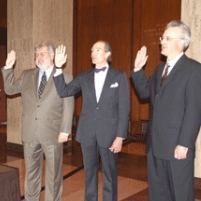Court Rules Power of Copyright Royalty Board Members is Unconstitutional
Thursday, July 12, 2012
 Copyright Royalty Board Members
Copyright Royalty Board Members
An obscure panel of judges who rule over copyright matters has had their powers curtailed by a federal appellate court.
After hearing a lawsuit from the Intercollegiate Broadcasting Systems Inc., which complained about a decision by the Copyright Royalty Board, the District of Columbia Circuit Court of Appeals decided the board’s judges possessed powers not permitted under the U.S. Constitution.
Created in 2004, under the auspices of the Library of Congress, the Copyright Royalty Board has members, who serve staggered six-year terms. The judges determine rates, terms and distribution of royalties collected by the U.S. Copyright Office. Although they are appointed by the librarian of Congress, the librarian retains no control over the judges once they take office.
The DC Circuit found this independence enjoyed by the royalty judges to be in violation of the Constitution’s appointments clause, which allows only the president, with confirmation of the Senate, to appoint officers with “significant authority.” The board does have such authority because it can “mean life or death for firms and even industries,” and because its decisions could not be reversed.
To partially fix this problem, the court struck down language limiting the authority of the librarian of Congress to remove the judges for cause. This in effect makes the royalty judges “inferior rather than principle officers” and will allow them to continue with their duties.
-Noel Brinkerhoff
To Learn More:
Overhaul in Store for Copyright Royalty Board (by Travis Sanford, Courthouse News Service)
Intercollegiate Broadcasting System v. Copyright Royalty Board (U.S. Court of Appeals, District of Columbia) (pdf)
- Top Stories
- Unusual News
- Where is the Money Going?
- Controversies
- U.S. and the World
- Appointments and Resignations
- Latest News
- Trump Deports JD Vance and His Wife
- Trump Offers to Return Alaska to Russia
- Musk and Trump Fire Members of Congress
- Trump Calls for Violent Street Demonstrations Against Himself
- Trump Changes Name of Republican Party






Comments